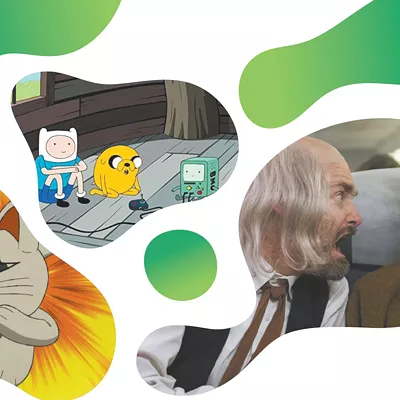Buzz Bin
[
{
"name": "Broadstreet - Instory",
"component": "25846487",
"insertPoint": "4",
"requiredCountToDisplay": "4"
},{
"name": "Broadstreet - Empower Local",
"component": "27852456",
"insertPoint": "8",
"requiredCountToDisplay": "8"
},{
"name": "Broadstreet - Instory",
"component": "25846487",
"insertPoint": "12",
"requiredCountToDisplay": "12"
},{
"name": "Broadstreet - Instory - 728x90 / 970x250",
"component": "27852677",
"insertPoint": "18",
"requiredCountToDisplay": "18"
},{
"name": "Broadstreet - Instory",
"component": "25846487",
"insertPoint": "5th",
"startingPoint": "23",
"requiredCountToDisplay": "24",
"maxInsertions": 100
}
]
by Inlander Staff
Cold Duck -- So by now, most of you have heard about the Arkansas attorney who got lost hunting, survived his twelve-hour ordeal by eating raw duck and was finally rescued when he flagged down a helicopter with his own underwear. What we're wondering is, what kind of hunter was this guy? Not to make too much fun -- well, actually, it's our job to make fun -- but let's review some basic survival points:
1. If you're going hunting, maybe reconsider going out clad entirely (almost) in camouflage. It's called "hunter orange" for a reason, pal.
2. "Don't drink the water" especially applies to the kind of brackish swamp liquid our Arkansas hunter decided to consume just hours into being lost.
3. Twelve hours is a little premature when you're considering eating raw duck you have to dig out with your bare hands.
4. Dude, you're an attorney and you wear tighty-whities?
OK, we've had our fun. While we're amused by this tale, we're mostly just relieved -- to mimic a similar sentiment voiced by a BBC reporter on this story -- that the lawyer was rescued before he ate his own bird dog.
When Ed Attacks! -- We were delighted to find not only an interview with the late Ed Kienholz in the current issue of The Believer, but also a retelling of the infamous "TWA Incident." Kienholz was a renowned installation artist who lived the last few decades of his life in Hope, Idaho, along with his wife, artist Nancy Kienholz. The interview, conducted by Lawrence Weschler in 1976, shows the artist at his most exasperating and entertaining. Weschler eventually gets Kienholz to tell him the story -- which is basically how, when Kienholz's newly acquired Tiffany lampshades got broken on a TWA flight and the airline refused responsibility, he was forced to take matters into his own hands. Oh yeah, his own hands, but holding an axe and destroying a manager's metal desk at TWA headquarters. The best part might be the pictures of Kienholz heading into the airport with his axe -- probably not something you could get away with these days.
Near Perfect -- Thanks, CBS and 48 Hours, for avoiding the temptation to show Spokane as a seedy dead-end town where criminals naturally go when they want to hide from the law. Your recent segment on Pennsylvania transplant Dr. Richard Illes, who relocated here after the unsolved murder of his estranged wife, showed not only a vibrant city but how local police personnel helped catch the not-so-good doctor. And how refreshing - after all the Robert Yates coverage - to see Spokane represented as more than just a few shivering prostitutes waiting for johns on East Sprague.
Publication date: 01/13/04
Cold Duck -- So by now, most of you have heard about the Arkansas attorney who got lost hunting, survived his twelve-hour ordeal by eating raw duck and was finally rescued when he flagged down a helicopter with his own underwear. What we're wondering is, what kind of hunter was this guy? Not to make too much fun -- well, actually, it's our job to make fun -- but let's review some basic survival points:
1. If you're going hunting, maybe reconsider going out clad entirely (almost) in camouflage. It's called "hunter orange" for a reason, pal.
2. "Don't drink the water" especially applies to the kind of brackish swamp liquid our Arkansas hunter decided to consume just hours into being lost.
3. Twelve hours is a little premature when you're considering eating raw duck you have to dig out with your bare hands.
4. Dude, you're an attorney and you wear tighty-whities?
OK, we've had our fun. While we're amused by this tale, we're mostly just relieved -- to mimic a similar sentiment voiced by a BBC reporter on this story -- that the lawyer was rescued before he ate his own bird dog.
When Ed Attacks! -- We were delighted to find not only an interview with the late Ed Kienholz in the current issue of The Believer, but also a retelling of the infamous "TWA Incident." Kienholz was a renowned installation artist who lived the last few decades of his life in Hope, Idaho, along with his wife, artist Nancy Kienholz. The interview, conducted by Lawrence Weschler in 1976, shows the artist at his most exasperating and entertaining. Weschler eventually gets Kienholz to tell him the story -- which is basically how, when Kienholz's newly acquired Tiffany lampshades got broken on a TWA flight and the airline refused responsibility, he was forced to take matters into his own hands. Oh yeah, his own hands, but holding an axe and destroying a manager's metal desk at TWA headquarters. The best part might be the pictures of Kienholz heading into the airport with his axe -- probably not something you could get away with these days.
Near Perfect -- Thanks, CBS and 48 Hours, for avoiding the temptation to show Spokane as a seedy dead-end town where criminals naturally go when they want to hide from the law. Your recent segment on Pennsylvania transplant Dr. Richard Illes, who relocated here after the unsolved murder of his estranged wife, showed not only a vibrant city but how local police personnel helped catch the not-so-good doctor. And how refreshing - after all the Robert Yates coverage - to see Spokane represented as more than just a few shivering prostitutes waiting for johns on East Sprague.
Publication date: 01/13/04



















